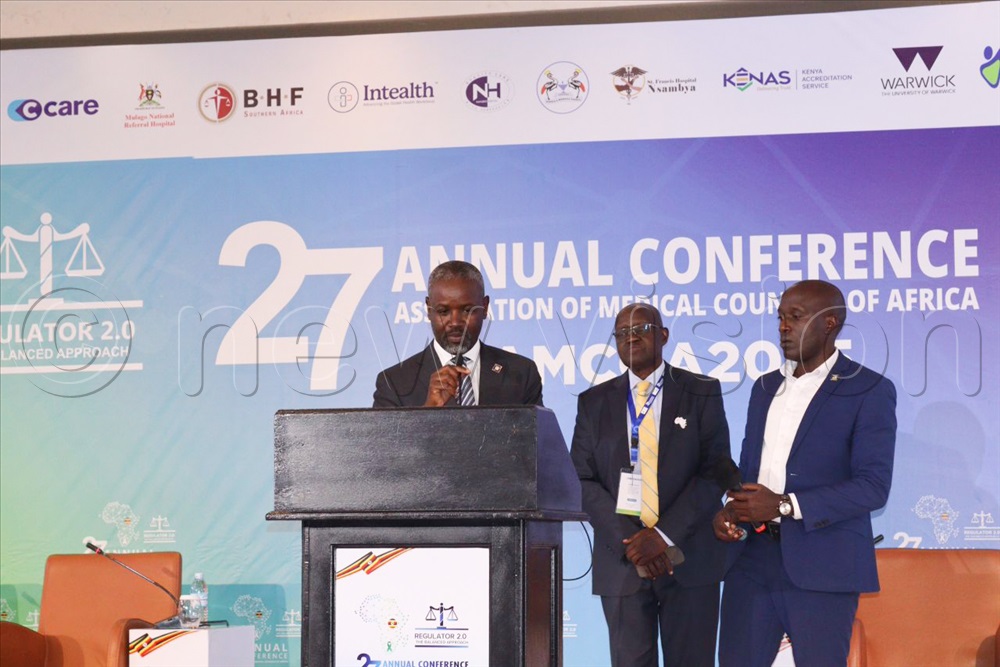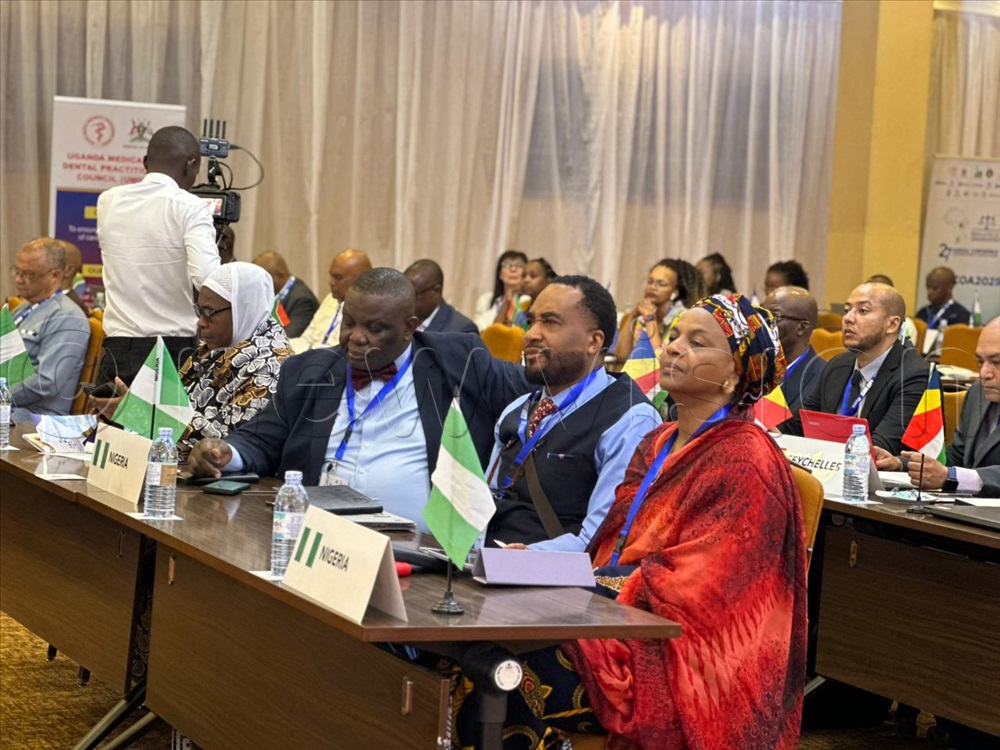Doctor welfare crucial for patient safety, says health minister Aceng
“Patient safety remains paramount, but regulators must recognise that the welfare of doctors is a critical component of a safe and effective healthcare system,” said Aceng.
Uganda’s Health Minister Dr. Jane Ruth Aceng in a group photo with medical practitioners and organisers of the conference. (Photos by John Musenze)
________________
Uganda’s health minister Dr Jane Ruth Aceng has urged African medical regulatory councils to prioritise the welfare of health workers, warning that overlooking their well-being could compromise the safety of health systems.
Speaking at the official opening of the 27th annual scientific conference of the Association of Medical Councils of Africa (AMCOA) on July 28, 2025, held for the first time in Uganda, Aceng told medical regulators that their responsibilities must extend beyond enforcing professional standards to safeguarding the people who deliver care.
“Patient safety remains paramount, but regulators must recognise that the welfare of doctors is a critical component of a safe and effective healthcare system,” she said.
Held under the theme: Regulation of Health Workforce for Patient Safety, the three-day summit has brought together representatives from 18 African countries to reflect on improving standards, oversight and support systems across the medical profession.
Aceng said the mental, physical and professional well-being of healthcare workers must be built into regulatory frameworks.
The Deputy Speaker, Rt. Hon. Tayebwa Thomas who was the chief guest urged medical regulating councils in Africa to maintain public trust in their duties.
“Burnout, depression and stress among doctors are not just personal tragedies—they are system risks. A fatigued, unsupported doctor is more likely to make an error. Therefore, investing in doctor welfare is investing in patient safety,” she said.
The minister called for more structured support systems within regulatory bodies and hospitals, including access to mental health services, safe working environments, and continuous professional development opportunities.
“We must go beyond licences and inspections. Let us ensure our doctors are working in environments where they feel safe, valued, and equipped to grow professionally,” Aceng urged.
Risk of losing medics
She warned that many countries risk losing skilled professionals due to neglect and poor treatment of health workers.
“When doctors feel unappreciated and unsupported, they migrate. That’s how we lose investments we’ve made in training. Regulation without care is hollow,” she noted.
Aceng acknowledged the critical role played by the Uganda Medical and Dental Practitioners Council (UMDPC) in hosting the event and encouraged African regulators to go beyond gatekeeping and adopt a mentoring and advocacy role in support of the medical workforce.
“Regulation must be transformative. It should build systems, encourage ethics, and inspire growth. Let us work with our professionals, not just judge them,” she said.
Aceng added that the health ministry was committed to integrating wellness and professional development into national health strategies.
“We will support our councils so that their work is not just about oversight but about building a strong and resilient workforce,” she said.
Maintain public trust
Uganda Parliament Deputy Speaker Thomas Tayebwa, who was the chief guest, urged medical regulating councils in Africa to maintain public trust in their duties, emphasising that this will promote key sectors such as Agriculture, Tourism, Minerals, and Science and Innovation (ATMS). He specifically highlighted medical tourism, noting that effective regulation is crucial in this area.
“If we don’t invest in the profession of medicine, we are doomed to fail at any time,” Tayebwa warned.

“You, as regulators, are the custodians of public trust. That public trust you must protect with generosity. Because the day you don’t do your job, we don’t know what kind of doctors we will have.”
He appealed to universities to produce more highly trained medical doctors to address the gap in the doctor-to-patient ratio. He urged regulators to not only enforce standards but also support institutions that are training future health professionals.
“Yes, regulate, but also nurture. Handhold these institutions instead of just rejecting them outright. But do not compromise on quality,” Tayebwa stated.
Tayebwa also decried regulatory confusion, particularly between national councils and regional accreditation bodies.
“You must harmonise your mandates—especially in East Africa. It’s wrong for one university to pass under the National Council for Higher Education and still be rejected by a regional council,” he said, warning that such friction stifles growth and creates legal gridlocks.
Leadership crisis
African Centre for Global Health and Social Transformation executive director Prof. Francis Omaswa called attention to the crisis of health leadership in many African countries.
“There is a serious leadership vacuum in health workforce planning,” Omaswa said. “We need people in government who understand how human resources in health are linked to disease patterns, not just bureaucrats who count leave days.”
He stressed that proper regulation must be backed by scientific workforce projections.
“We have the data to calculate exactly how many doctors, midwives and specialists are needed every year, based on population and disease burden. But our systems are not utilising this knowledge,” he added.
Omaswa also warned that the increasing privatisation of medical training was creating quality risks. “Private institutions are admitting more students than they can train effectively. We must strengthen regulatory oversight before it’s too late.”
UMDPC chairperson Prof. Joel Okullo Odom called for regulators to adopt a proactive, nation-building approach to healthcare.
“If we regulate poorly, we produce bad doctors who go on to teach the next generation badly. We must break that cycle.”
Okullo praised Uganda’s progress in advanced procedures, such as local kidney transplants, saying these were signs of what is possible when regulation, training, and welfare align.
“We have the laws; we have the brains—what we need now is consistent support and intentional development,” he said.
The AMCOA conference, hosted by the UMDPC in Kampala, is expected to conclude with new frameworks for harmonised medical regulation across Africa, including joint mechanisms for enforcing standards, ensuring safety, and advancing workforce development.
Aceng was hopeful that the outcomes of the summit would translate into practical, country-level improvements.
“The future of Africa’s health systems depends not only on funding or infrastructure but also on how we treat the people who serve in them. Let us build systems that care for carers,” she said.
As delegates engage in policy discussions and breakout sessions, the tone has been set: regulation must evolve to become a force for transformation—supporting both the doctors and the millions of lives they touch.